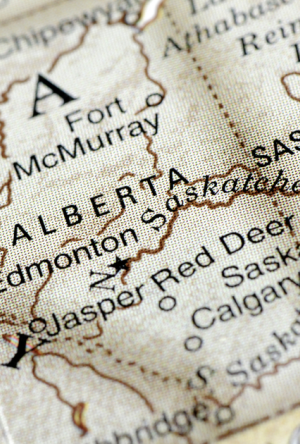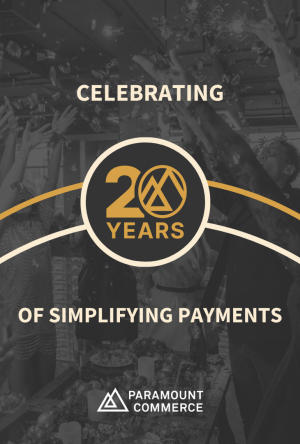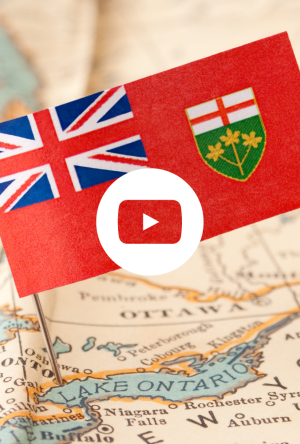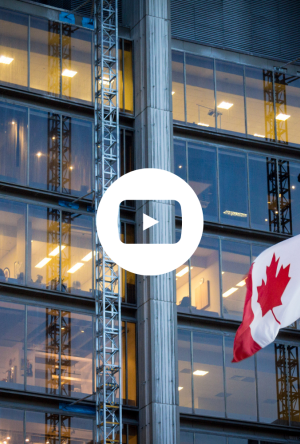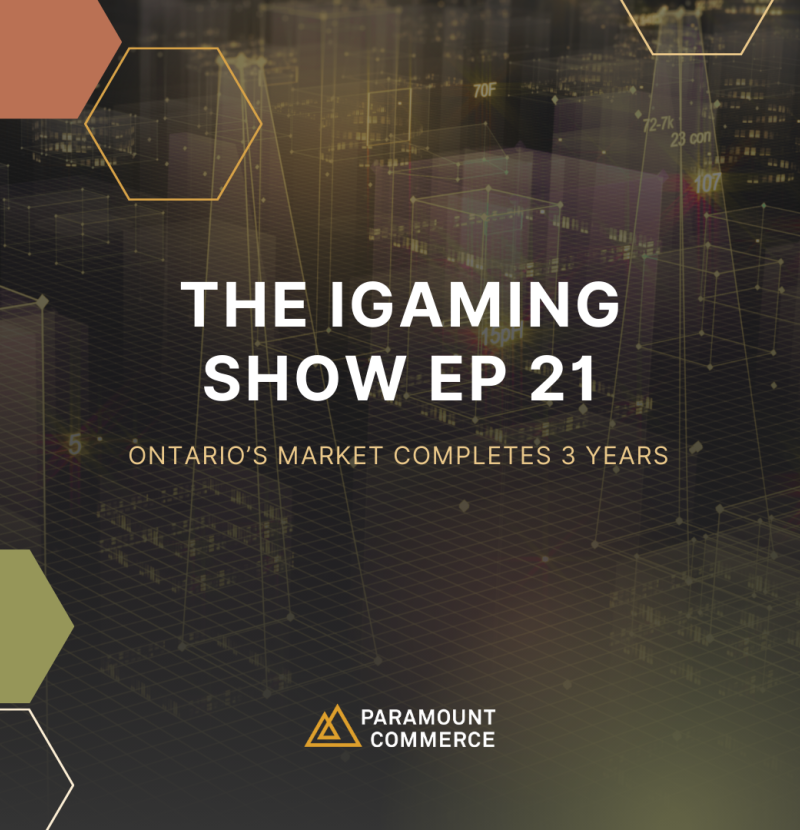
The iGaming Show EP 21 - (Ontario’s iGaming Market Completes Three Years With Paul Burns)
In this episode, we explore the journey, challenges, and successes that have shaped Ontario’s regulated iGaming market, highlighting its economic contributions.
Guest: Paul Burns, President & CEO at the Canadian Gaming Association.
The iGaming Show, presented by Paramount Commerce, is a podcast that will analyse gaming industry trends with experts from various gaming organizations.
Please like, comment, and share this video. Also, stay up to date with our content by subscribing to our YouTube channel.
Varad Mehta: Hello, everyone, and welcome to the 21st episode of The iGaming Show, presented by Paramount Commerce. I’m your host, Varad Mehta in this podcast, we analyse gaming industry trends with experts from various gaming organisations. In today’s episode, we explore the growth of Ontario’s regulated iGaming market as it enters its third year with Paul Burns, the President and CEO of the Canadian Gaming Association. So without further ado, let’s get the show rolling. So as you know, Paul, we always begin with a few fun questions, and I’m here to annoy you once again with them. So the first one is, if you were a politician, what would your campaign slogan be? And I have three picked out, but I don’t know if you have thought about this in your own mind before.
Paul Burns: I’ve worked for enough political leaders and politicians in my day that I would never run from office. While I open with that…
VM: Would you want to know what slogans I picked out for you?
PB: Yes, I’m very curious to find out what you picked.
VM: I’m so sorry, but your last name is Burns. There’s just going to be a lot of puns. It’s bound to happen. So we have Burns Baby Burns. Then we have Feel the Burn, which is a classic, I thought. ChatGPT recommended this one, and I thought this could be a good one if it captured it. It’s Paul Burns: A Name You Can Trust, A Fire You Can’t Put Out.
PB: I have to go back to ChatGPT. That’s pretty good. My family history goes back to a long time in Toronto, the 1830s-40s, and my family ran a coal delivery and wood delivery business in Toronto. The business slogan was Burns Coal Burns Best.
VM: Oh, okay. That’s so cool.
PB: So I think someone was a good marketer back in the 1840s.
VM: I love that. They didn’t need AI or my jokes.
PB: No, exactly. But that was the business slogan, and that’s and we still have some of the paraphernalia from that. But I confess, the fire you can’t put out.
VM: I love that.
PB: And I think it is just going to being a personal moniker going forward.
VM: It’s written down somewhere. It’s just located.
PB: Exactly.
VM: Now, going to the topic of discussion. I think this is an annual thing. Whoever watches these episodes know that Paul appears whenever the industry is turning another year old. So this is the third year anniversary. So Paul, I read the report that iGaming Ontario published, and they spoke about how the economy grew significantly in year two. There was GDP rising, labour income increasing, and job creations increased as well. So first of all, did you anticipate this level of growth? And what do you think contributed to these numbers?
PB: The fact that I think the industry still continues to grow in Ontario and is really a testament to the model that’s been created that makes it conducive for people to want to be a part of it. The barriers to entry aren’t exceptionally high like they are in other jurisdictions. There’s not a multi-million dollar upfront fee. There’s not excessively high tax rates where governments are taking disproportionate shares, that there’s still room for people to come, and innovators, and to startups, that there’s still room in the Ontario iGaming model for that to happen, and there’s still new entrants coming. Yet, some people will leave, but very few have, let’s be honest. And the fact that the attributes of that model has made it, has built its success. I think that that’s… That’s something to make sure it’snurtured and not to be assumed that, Oh, it’s always going to bethis way if we just…No, you can’t. That’s one of the messages we send to governments, is that you can’t take this for granted. You can’t just assume that people accept whatever you put on the street. That’s where Ontario listened. There was the agencies involved, which took great pains, which is very unique, I found, in the world when we got into it, where regulators, the agency was engaging with the industry and having conversations and building relationships, and iGaming Ontario has done the same. And the interesting part of this is what the unique part of Canada is that…Some see it as we have two regulatory structures because iGaming Ontario is a conducting manager responsibility because of the Canadian law. And then we have AGCO, which is your traditional regular, everybody understands. And there’s compliance costs with both regimes. The operators have reporting requirements to iGO, they have reporting requirements to AGCO. Which that doesn’t sound in any other jurisdictions, really. So there’s usually a regulatory structure, and there’s a tax, and you just pay a tax, and that’s it, and you move on, and there’s very little reporting on the business side. That’s the difference. And to be able to say within that and understanding that there’s costs associated with that and expenses that building into the supporting mechanism. In all of that, that’s what’s kept the fairness of the share model, the fees and other things. We’re still very concerned that those costs – keep them at a fair level, don’t see the creep happen because that’s what can hurt industries. And so that’s why it’s still an nurturing exercise that’s required, because especially with iGaming, you can turn off a site and move on if it’s not going to work for you. And if the model doesn’t continue to demonstrate that fairness where there’s risk and reward opportunities, then we’ll lose it. But the fact is that we’ve still seen growth in the marketplace. I still think there’s a maturity to the customers that’s still coming. It’s a semi-mature stage, I would say. That’s my term. I don’t know if you agree with it or not, but the point is I still think that there’s, in sports betting, in terms of educating sports betters and growing the knowledge base and all of that so there’s more sophisticated sports betting. All these things are still there, and that’s the encouraging part of it all. But also understand that you have to maintain and work hard to make sure that that still continues to work. And that’s the advice we’re looking when we talk to other jurisdictions. I think that there’s important lessons from what Ontario has done, and having recently been in conferences in the United States, and listened to people talk about the lack of iGaming availability and the fact that there’slimited operators in markets. Ontario got a lot right, and that’s to be celebrated. And a lot of people in the industry around the world are looking at it and still talk about it, and that’s great. But at the same time, I say, don’t assume it. You have to work hard to make it, and don’t lose focus on that.
VM: No, for sure. And I think another thing that Ontariogot right was market adoption. And that’s why I read the report and it said that approximately 86.4 % of Ontarians gamble online using regulated sites, which is a huge win. So what strategies have been the most effective in driving this huge level of legal or regulated market adoption from a consumer standpoint?
PB: I think it’s the choice. I think part of that is the wide array of choice. Because the history of online gaming didn’t start three years ago. It started when the Internet started offering the Internet gaming in the late ’90s and 2000. And that there’s customers, people found the entertainment options they wanted, whether that’s through a casino or through sports betting, and understand that those companies, and this is where Ontario, their first philosophy was trying to invite the unregulator market in and make it conducive for them wanting to be here, and not having a heavy hand, but knowing that the industry wants to be regulated and was willing to paya fair share of tax. And from consumers, I think it’s the choice. And then the wide range of products. In many US states, you can only get sports, you can’t get this, you can’t get that. Everything’s there. And I think that’s also the fact that you don’t have to go hunting for something you should like when you have a choice of the 80 plus sites in the regulated market, there’s no need. And that’s the plus. And the other plus in that is that you’re not fighting a large swath of illegal operators in the Ontario marketplace at the same time. And while protecting markets important, I think the ability for the wide array of choice that people have of productsand brands, and that’s really what’s made that very quickly get to that level, which a lot of jurisdictions around the world strive to get it in three or four or five years, or they never get there. But they got there almost out of the gate, and that’s because of the wide options for consumers, that there’s a huge way of choice, and that’s very important.
VM: True. And I think another thing that probably consumers also took in at that time, initially when the regular market launch was this narrative around consumer protection, where there are great responsible gambling initiatives behind where they do…Everything that was done from a regulated market standpoint was for their own benefit. So that’s what my next question was that we spoke about initiatives such as the RG Check Accreditation last year, the centralised self-inclusion programme that we spoke about. How effective have these programmes been and what further steps are planned to promote more safe play and more consumer protection?
PB: I think that’s one of the two benefits of this marketplace, where we’re seeing success with a very robust level of consumer protection, marketing restrictions, and the RG requirements for this market. And that’s where I think it, again, points to tremendous success when you look at the small things, but the measures that add up, and there’s lots of them in the regulatory centre. So you mentioned the RG accreditation check, holding operators to a responsible level, and that you must go through this. It independent accreditation process to evaluate your programmes, that you’re offering tools to players so they can manage their play, that you are monitoring player play for risk on a continuous basis and then you’re having an intervention regime that matches that. So when players get out of their risk profile, that you’re intervening in that escalation. You add that with no mass market advertising or bonusing incentives, the requirements to opt in to receive bonuses and incentives from operators, to the requirement to spend a percentage of your GGR on stand-alone responsible gaming advertising to promote the RG tools and the RG programmes. You have all of these things, and you added and it has created an exceptional regime of consumer protection. The KYC. Minors do not get access to an Ontario regulated site, haven’t, and why they shouldn’t, that they don’t. And that’s why when you look at what’s been created in some of the most robust standards collectively in the world, and people like to point to other jurisdictions. Look, oh, the UK is so much better than they do this. Well, they still offer bonus and incentive and mass market advertising. Their TV commercials in the UK wouldn’t get on the air in Ontario because they don’t meet the standards. But it’s like, take a step back and take a look and pat ourselves on the back in some ways, too, because that’s the starting point where we’ve come from, and a lot is right, and a lot has been effective. And the other point is that the industry is not standing still and won’t. If there’s ways to improve and be more effective in doing things, let’s do it. Let’s do it based on evidence. Let’s do it based on sound research, not on emotion or what another jurisdiction is doing just because they did it, because I see a lot of changes around the world, but a lot of them are based on evidence. A lot of them are based on any expected outcomes. We don’t really care if they’re effective. We’re just going to do them because we think we should. Well, that’s usually the wrong reason. You got to base it on these. You have to be effective, and let’s make sure. And I think that evaluating the effectiveness of the entire regime, I think, is we’ve seen really good results in terms of compliance from operators and operators having to up their game and continually improve. It’s been great. And I think all of these pieces, when you add it all up, and looking at the success of the market because of the choice and the willingness. And I am a fan of it because I think we’ve found a tremendous balance out of the gate, and I think that there’s… But no one’s standing still. Everybody is willing to keep eyes open and understand what can we do better. But I think when you look at this, it’s a great model for other jurisdictions to seriously consider when they look at their own.
VM: So true. And speaking of other jurisdictions, there was a really hot topic last year. It was all over the gaming industry within Canada, just taking a step aside from here for a second, but Alberta had been in discussion last year a lot. And I think there were some talks with Ontario on how to basically not copy a model, but be inspired by it and how to launch their own framework. While that launch has been delayed last year, have you seen any progress from that end? And have you spoken with other provinces or other regulators within provinces who might be more willing or might be more ready to launch their regulated iGaming market soon?
PB: I think the province of Alberta has indicated they want to pursue a regulated marketplace and are working towards that. And we’ve encouraged other jurisdictions to begin the conversation. It’s about a dialogue. It’s about understanding the needs of your current gaming stakeholders in your province, the land-based operators, terrible gaming operators. Everybody comes to the table together and have this discussion because you get the best outcomes that way. And that’s what we’ve encouraged them to make sure that you take the time, you get it right. And there’s no need for speed. It’s about getting it right. And that’s why in those discussions, we’ve had a very productive conversation with officials in Alberta, and everybody has taken a look and evaluated and spoken to AGCO and iGO from across the country to learn, because obviously, it was their first to do it. And a lot of provinces will spend time talking to them, which is great. And understanding that the only solution to fix this unregulated grey market, whatever people want to call it, I’m sure it’s the unregulated market, is through creating regulatory regimes. And those solutions reside in provincial giving regulators and creating and with the support of the provinces to go and do that is to create these regimes. And that’s what because the Internet has been an invasive tool. It’s changed a lot of industries. And if you’re in the hotel business, Airbnb may have made changes. If you were in the taxi business, Uber and Lyft made huge impacts on business. And retailers from not having to go to stores and getting stuff delivered to your door by everybody. You don’t have to. Gaming is one of those things, too. And accept that the old models are done, you have to sit down and enter that the first principles about why you offer gaming in your jurisdictions is really about consumer protection first. Yes, there’s great revenue from it, and probably have benefited and enjoyed those revenues. But the understanding is, too, is that you also need to make sure that you got to build a sustainable marketplace. And that’s the biggest thing they need to understand as governments, is you need to build sustainable marketplaces, and the consumer preferences are changing. If people didn’t like it, they wouldn’t go and use it and spend money on it, but they do. And so the consumer has with their feet and their wallets and their clicks. And they’ve said, we like this offering, and that’s what we want. And so you have to respond to that. And that’s where the need for…We said it in any jurisdiction. I spoke to Canadian regulators meeting earlier this year or late last year, and said, It’s time to work together. The issue, if you are upset about advertising, that’s nice, but you…it something goes away, does the product go away? No, because the product’s been there for 25 years, long before you were complaining about advertising in your jurisdiction. And it’s not Ontario’s fault. Ontario took the measures to fix their own house, create a regulatory regime that provides better consumer protection, offers economic benefits to the province through employment, supporting innovators, and also through to revenue share. So it’s like, let’s have the discussion. Let’s not try and sit there and say that the world isn’t going to change. And the way we’ve done it, always done it, should be the way we keep doing it. No. That’s not realistic anymore. And that the industry – if you are willing to have this conversation. And everybody, I think, supports the same objectives at the end of the day. And that’s why we’ve had productive conversations. Those provinces to understand and learn, and that’s what we’re asking them to do.
VM: I love that. I’m going to tie my last question into two and make it a big question. But as Ontario’s gaming market enters its third year, and looking at the Canadian gaming space in general, what do you see as the biggest opportunities and challenges? You just spoke about one that having that conversation is really important, but are there any technological opportunities that you’re interested in seeing within the regulated space in Ontario or overall in Canada, and what are some challenges that you’d love to tackle this year?
PB: Wow. Okay. I’ll give you some ideas. There’s a couple of challenges the industry needs to face on this year, and it’s not just the operator-supplier community that we represent, but in terms of governments and regulators and other agencies involved in gaming, is really to understand that we’re all addressing, as I said, the right priorities, and when it comes to ensuring that you’re creating sound regulatory environments and consumer protection is at the forefront of what we’re doing and offering a model that encourages participation, and that people want to sign up for and be part of, and like Ontario has done and has to work hard to continue to maintain, in my opinion. But I think we can maybe look to…There’s a lot of great innovators in this country doing amazing things around the space. I think from Paramount’s position in terms of getting the government of Canada to better adopt open banking and embracing the FinTech sector in letting them loose to do what they can do, to modernising our AML laws in Canada, which is that they are out of date. We’ve been pushing the government and encouraging them and made submissions to how they can better create a regime that better reflects more on our industry in the way it practises, but also we’re also demonstrating our wanting to make sure that we’re building the most compliant, effective regime for addressing money laundering and cyber attacks and other things like that as an industry. We’re at the forefront of taking on all these issues. And government sometimes catches up to what we want to do. But I think the innovator side, in particular, because you see, I was at iNext last week, and there’s a half a dozen Canadian companies in various stages that have grown out of this country and standing there and looking for investors and new customers and guys from Hot Takes and Cure-Up Gaming, a lotof people in the affiliate space. We got to find ways to support them and encourage governments to find ways. This is beyond the gaming, it’s the broader technology sectors. How do we better support innovators in our country? But also ensuring that we can start-up companies that want to come and take a chance, that there’s a way for them to do that within this regime and taking the economic development side of this, because there’s great technology, gaming technology centres in this province from Moncton to Vancouver and parts in between, that there are great people doing great work, and we got to celebrate that and be more interiors for it and creating policies that allow them to do business at home, to stay at home, and raisetheir capital and sell their products. We can do more on that, I think.
VM: I love it. I just want to thank you once again for joining us on an annual basis and answering our questions. I think when it comes to Alberta or looking at Ontario’s regulated space or whatever is happening within the country, I think this is such a good conversation. And to learn from the expert himself, it’s such a great thing. You’re going to the US, you’re going around the world, so whatever you hear, and then you let us know as well. So we’re so thankful. And as always, thank you so much, Paul, for joining us on the show.
PB: Thanks for having me. And thanks to everybody at Paramount. Keep doing the great work you do. And maybe we’ll talk before another year passes.
VM: Oh, yes. Surprise, hopefully. Thank you, Paul.
PB: All right. You be well.
VM: Whether it is boosting the local economy or providing players with a more secure way to bet on Ontario’s regulated iGaming market has seen significant growth in the past two years. I want to thank Paul Burns, the President and CEO of the Canadian Gaming Association, for joining us today and providing his expertise. If you have any questions for us or Paul, then please do comment them down below. Please don’t forget to like and share this podcast episode, and don’t forget to subscribe to our YouTube channel. For the episode transcript and more amazing content, please visit our website at paramontcommerce.com. Thank you so much for tuning into The iGaming Show presented by Paramount Commerce. I’m your host, Varad Mehta. Until next time, keep gaming.






